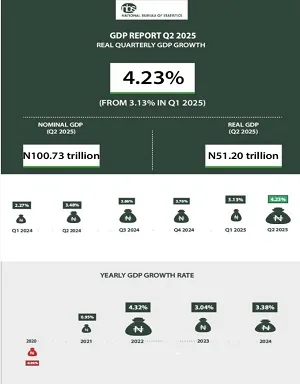Nigeria’s Gross Domestic Product (GDP) grew by 4.23% in the second quarter of 2025, according to the latest report released by the National Bureau of Statistics (NBS), signaling continued recovery and resilience in the face of global and domestic economic headwinds. The positive growth trajectory marks one of the highest quarterly expansions recorded in recent years, driven largely by robust performances in the services, agricultural, and manufacturing sectors.
The NBS, in its quarterly GDP report, attributed the strong performance to improved oil production, increased investor confidence, and relative macroeconomic stability during the period under review. This figure represents an uptick compared to the 2.98% growth recorded in Q1 2025, underscoring a steady rebound from earlier economic pressures including currency instability, inflationary spikes, and external trade imbalances.
According to the report, the non-oil sector remained the main engine of growth, contributing significantly to the nation’s overall output. Key sub-sectors such as information and communication, financial services, trade, and agriculture all posted positive results, reinforcing the Federal Government’s diversification agenda aimed at reducing overdependence on crude oil earnings.
On the oil front, crude petroleum and natural gas saw a modest recovery as average daily oil production rose to 1.52 million barrels per day in Q2, up from 1.43 million barrels per day in the previous quarter. This development was partly due to improved security in oil-producing regions and renewed investment in upstream operations following policy reforms.
The services sector, which accounted for the largest share of GDP, experienced significant growth, particularly in ICT and banking, thanks to increased digital adoption, financial inclusion efforts, and expanded mobile money operations across the country.
Economic analysts have interpreted the Q2 performance as a strong indicator of Nigeria’s potential to achieve its full-year growth target of 4.8%, provided that ongoing reforms in the fiscal and monetary space are sustained. The Central Bank of Nigeria’s continued tightening of monetary policy, combined with coordinated efforts to stabilize the naira and curb inflation, are believed to have supported investor sentiment and domestic consumption during the quarter.
Reacting to the report, economic stakeholders praised the resilience of key sectors and called for further investment in infrastructure, energy, and human capital to sustain the momentum. With global oil prices showing some level of stability and domestic production gradually improving, the outlook for the remaining half of the year appears cautiously optimistic.
As Nigeria positions itself as a regional economic powerhouse, the latest GDP figures offer a glimpse of hope for millions of citizens eager for tangible improvements in job creation, inflation control, and living standards. The NBS maintains that it will continue to provide timely and accurate data to guide policymaking and support long-term national planning.
